Archived News Item
A Gem of a Partnership
April 3, 2024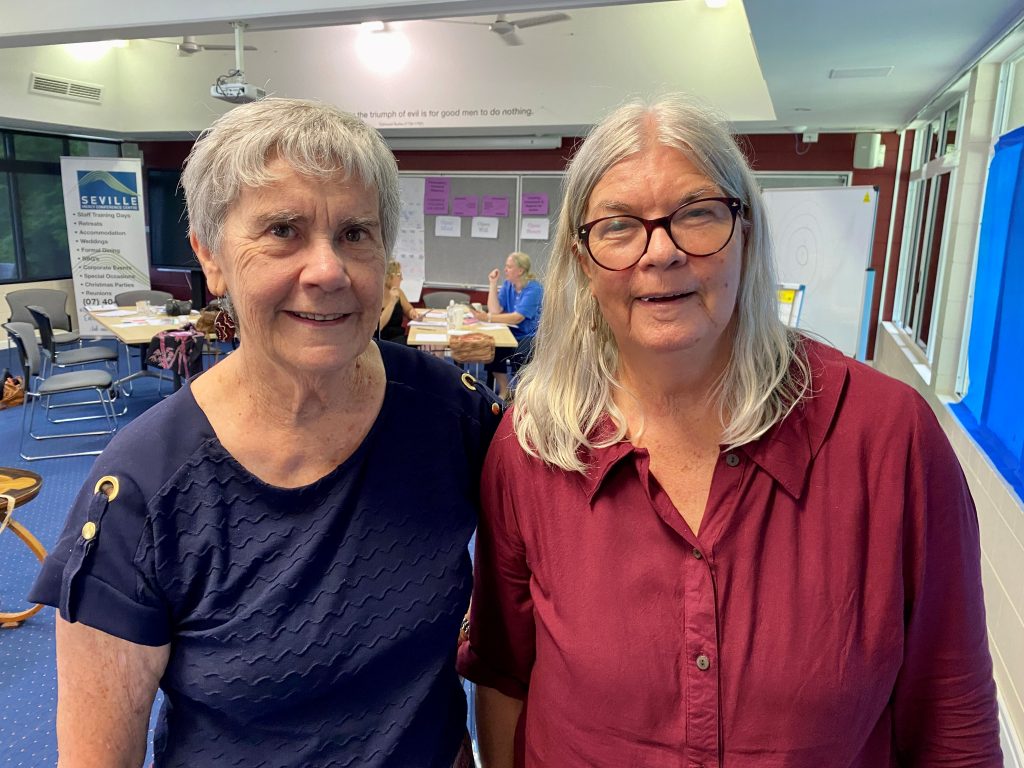
Sister Margaret Endicott and Pam Searle.
For over thirty years Sister Margaret Endicott and Ms Pam Searle have been undertaking ministry together facilitating hundreds of sessions in what they describe as a ‘gem’ of a partnership.
It is not often that people can say that they have worked with someone for 30 years, yet this is the case for Sister Margaret Endicott and Pam Searle. Since 1993, this dynamic duo has facilitated hundreds of sessions in the religious, not-for profit and government sectors. During this time, they have enabled individuals and organisations to thrive, which is due to their talents as facilitators and their ability to apply tried and true facilitation methods such as Technology of Participation (ToP) and the more recently developed ‘Theory U’. A key underlying philosophy for both Margaret and Pam is ensuring that everyone can have a voice.
“The facilitation we do comes from a values base which recognises that everyone is different and everyone needs to have the opportunity to contribute,” said Margaret. “Everyone has wisdom but not everything that we say is wise. Good facilitation helps people express that wisdom.”
Pam agrees and says that for everyone in the room to have the opportunity to have a voice, there has to be different ways of expressing it. “In the room you have some people who naturally process things kinetically, others aurally and some visually. This is why the ToP methods are so great as they enable expression in different ways, including movement.”
Margaret said facilitation provides a space for people to dream, implement those dreams and celebrate their achievements. “People often say to me they go into facilitation sessions with a thousand ideas running through their heads yet no path forward on which ones to implement and how to do it. A good facilitation session should leave the participants with key strategies and priorities that they can make happen.”
Pam said a key ingredient in a good facilitation session is getting the ‘flow’ right. “If you design the process well, considering who the participants are, what’s going on for them and what needs to happen, it should flow and so all you are doing as a facilitator is the process and they should then express the content needed for that conversation. You know that you are getting the flow right when people will start answering your next question before you ask it. I must say achieving perfect flow doesn’t happen very often, but when it does it gives you a real buzz and you say to yourself ‘I am on it!’.”
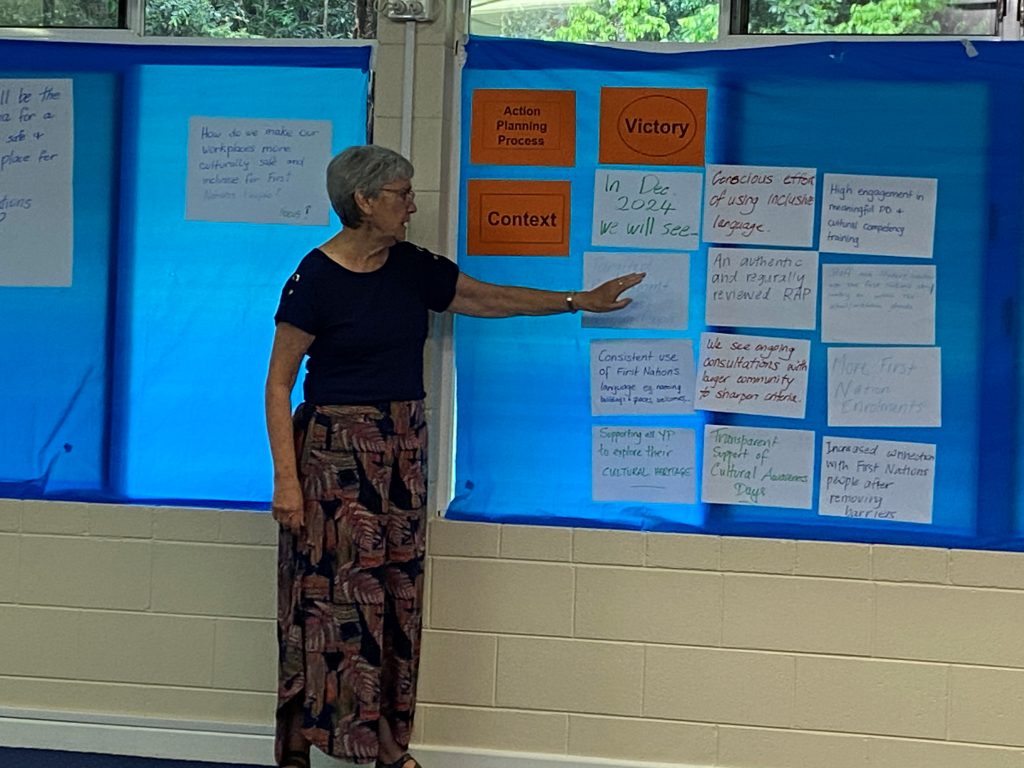
Margaret Endicott.
Starting Out
Margaret and Pam began their working partnership in the early 1990s when Margaret was engaged as a consultant at a community services training organisation at which Pam was working in Logan, south of Brisbane. Both Margaret and Pam developed their initial interest and grounding in facilitation during their time working in education.
“Although while teaching I wasn’t strictly facilitating, it did teach me how to work with a group,” said Margaret. “Teaching really helped, particularly as working with little kids teaches you how to work with adults!”.
Pam said that when she was in her twenties, she did social work and then later outdoor education. “I worked in the outdoor education space for seven years. While working with groups of young people, I fine-tuned my group skills designing group programs/activities aligned with the experiential learning steps, the stages of group development and the type of leadership needed at the different stages. Then, when I moved into working in youth organisations, I would often get asked to facilitate meetings because of the group skills and experience I had after having worked in outdoor education.”
TOP and Theory U
Both Margaret and Pam attribute their journey to becoming professional facilitators to the Institute of Cultural Affairs, who are the founders of the ToP methodologies. Margaret did formal training with them in Chicago in 1997 and both attended ToP conferences in Sydney in the late 1990s and in Denver in the early 2000s. Another important influence has been Theory U, a method developed by Otto Scharmer in 2007.
“Both Marg and I went to a Theory U Conference in Western Australia in 2018 and it deepened our understanding further,” said Pam. “It was like ToP was horizontal and Theory U vertical. It was incredibly important because it enabled us to introduce art, physical movement and dance. Their philosophy was that people say things in many different ways and you don’t have to use words.”
Margaret was attracted to Theory U, due to it being close to theological reflection, including the Mercy Theological reflection process. Theory U also encompasses going to your source. “There is a real sense for me that it joined two things together – my faith with my skills of facilitation.”
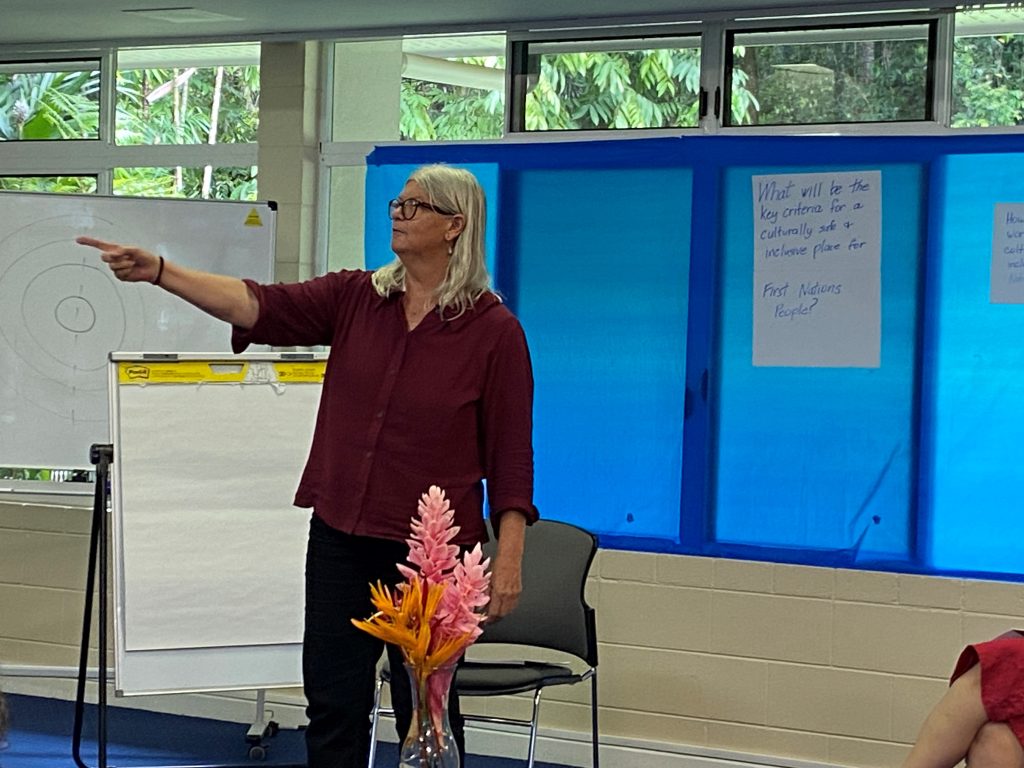
Pam Searle.
Preparation is key
In addition to utilising methods such as ToP and Theory U, both would agree that successful facilitation requires many hours of preparation. They cite established wisdom which says it should involve 1/3 preparation, 1/3 facilitating and 1/3 debriefing and documentation.
“For a two-day facilitation session we will often spend two, sometimes up to four days or more preparing and this may include some vigorous discussions between us,” said Pam. “Even during the session, such as at the end of the first day, we most likely will work another three hours preparing or debriefing after the day to work out what is going to happen the next day. It may already be planned to within an inch of its life but we may need to replan it because of what happened on the day and who was there.”
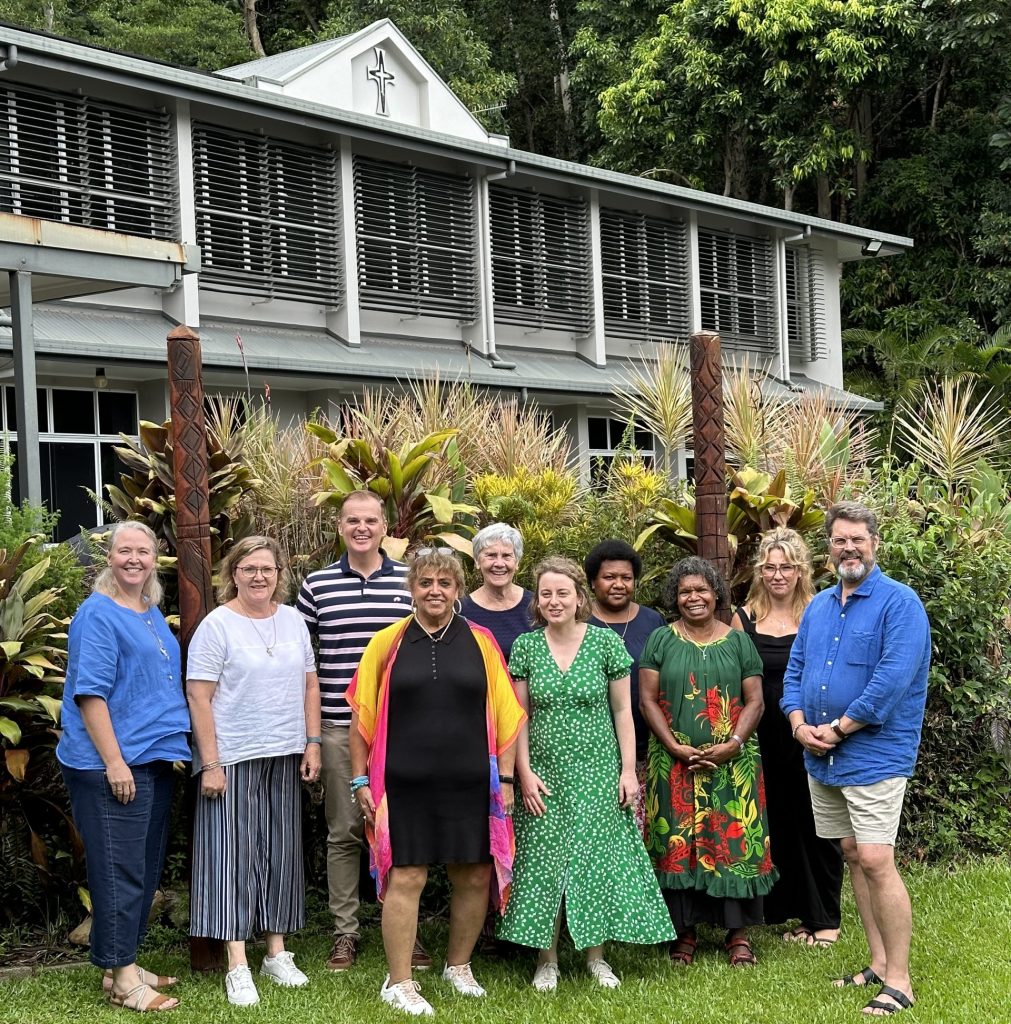
Some of the attendees at the January Facilitative Leadership Course at Seville in Cairns with a Mercy Connection – Amanda Squire and Toni Foley, Our Lady Help of Christians School, Cairns; Libby Blom, Mercy Partners; John Rochester; Ana Pintos, Sisters of Mercy Parramatta; Marg Endicott; Jemima Welsh, Mercy International Association; Rachael Waisman; Theresia Tina; Jaimee Hislop, Our Lady Help of Christians, Cairns; and Paul Blom, Mater.
Upcoming Facilitative Leadership Courses
At the end of May, Margaret and Pam will be running their Facilitative Leadership Course in Brisbane, followed by another course later in the year in Melbourne. The course includes experiencing the methods, exploring the theoretical underpinnings and practical application of ToP and Theory U.
“I think anyone who is interested in meaningful conversations that result in consensus as a way forward would benefit from the course,” said Pam.
Margaret said even people who aren’t facilitating regularly would find the course useful. “After having done the course, if you are in a group and you aren’t the facilitator or the leader you will be able to understand the process that is happening or what is missing. From the vantage point of a participant, you can ask a question that pulls the group in a direction.”
Helping people grow
Margaret and Pam are keen to ensure the next generation of facilitators and leaders take up the baton and carry it forward. In 2024, they are training six younger women who have been using the methods as facilitators and want to become trainers of the Facilitative Leadership course. Marg and Pam are really excited about their involvement.
“This has been my full-time ministry for more than 30 years. There is a sense that we have learned things over the years and we are interested in sharing it with younger people. A lot of the theories are old but still valid, yet they are not taught much elsewhere,” Margaret said.
Pam said they are particularly drawn to people that are committed to those within their organisation having voice. “The facilitation methods we use are inclusive for all, including those who may otherwise struggle to be heard such as First Nations people. I want to help people grow, particularly those in senior positions who are trying to do best they can to give all people a voice.”
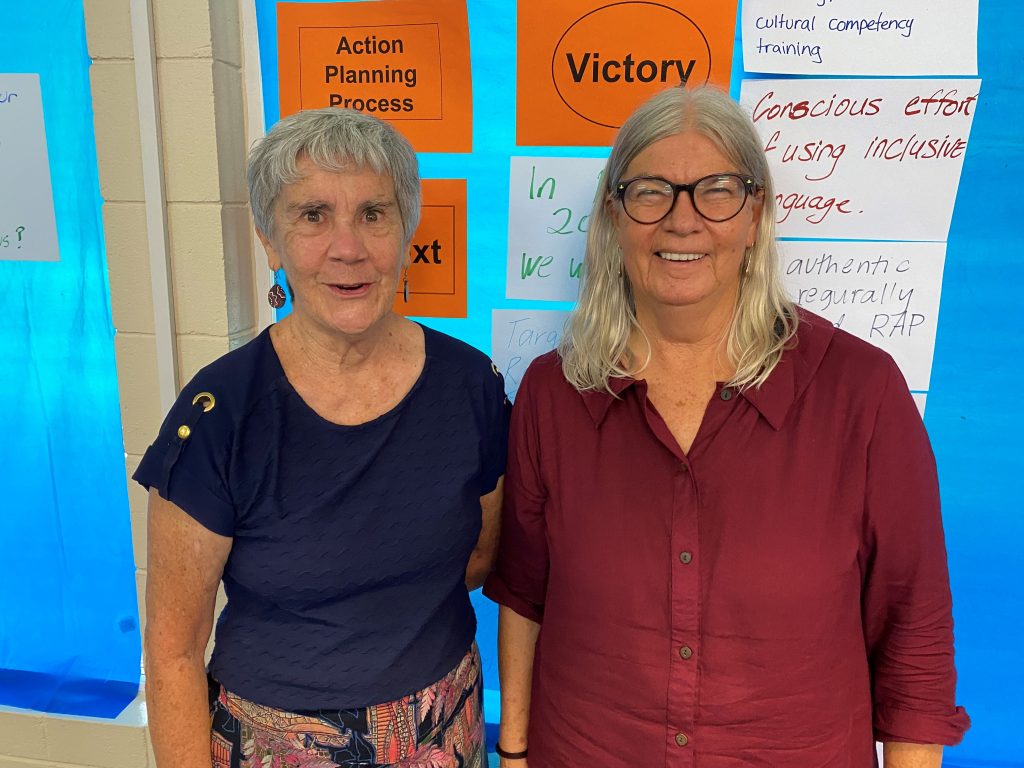
Marg and Pam.
Thirty Years Working Together
When asked after 30 years of working together what would they say has been the key to their success, both immediately put it down to the fact that they complement and respect one another.
“Pam likes preparing two minutes before we start! I like doing it at least a few weeks earlier. This has taught me to prepare in a way where I try to hold what I have prepared more lightly, although if it gets too close to the wire, I won’t hold it lightly any longer!”, said a smiling Margaret.
Pam said that where she is vulnerable, Margaret is strong and visa versa. “Marg is good at opening it up and closing down facilitated discussions and I am good in the middle where I go all over the shop, enticing the voicing of differences. Our working relationship is a gem. It is very special. It has taken hard work, honouring our different strengths and trusting each other implicitly.”
For more information about the upcoming Facilitative Leadership Courses please email –
Pam Searle for 30, 31 May, 1 June in Brisbane – Pam.Searle@ereafsn.edu.au
Margaret Endicott for 17,18,19 October – margaret.endicott@mercy.org.au
Interview conducted by John Rochester
